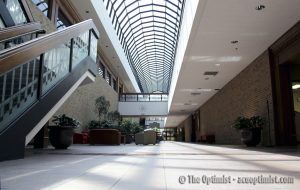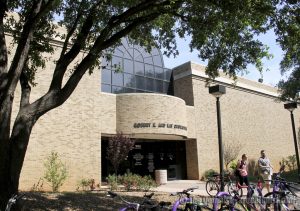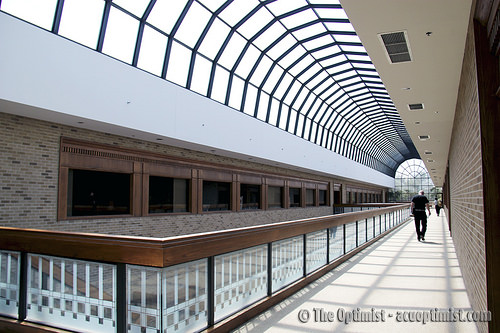Growing up in Fort Collins, Colorado, Wade Casey never imagined he would one day work toward earning a Masters degree from the ACU Graduate School of Theology. In fact, college didn’t appear on his radar at all until spring of his senior year in high school.
“One day I just went in and talked to my mom and was like, ‘I think I may want to apply for college just to see if it’s an option,'” Casey said.
Little did he know he would spend the better part of the next decade in West Texas studying for two Masters degrees, with the landscape a far cry from the majestic scenery of his hometown 12 hours away. There must be something here worth sacrificing mountains and trees for dust and flat plains as far as the eye can see.
ACU’s Graduate School of Theology finds itself asserting its place as one of the most prestigious graduate theological institutions in America, attracting students and faculty from all corners of the globe.

(Optimist photo by Erika Bolado)
ACU has offered theological and ministerial graduate degrees since 1953, according to the ACU website. The GST though, was not founded until 1999, when it was officially established as a professional school. Since its inception in the mid-20th century, the school has produced hundreds of ministers, missionaries, and students and equipped them to serve throughout the world.
Perhaps the greatest draw for students and faculty alike is the opportunity to work alongside and learn from world-renowned scholars with resumes and skillsets as impressive as the universities from which they have studied.
Names such as Dr. Fred Aquino, professor of theology; Dr. Jeff Childers, Carmichael-Walling Chair of New Testament and Early Christianity; and recently retired James Thompson, former Onstead Chair for Biblical Studies, are prominent in theological circles around the world. Some, like Childers with the Syriac language, have levels of expertise in certain areas matched by only two or three dozen people worldwide.
Dr. Ken Cukrowski, dean of the College of Biblical Studies, said the faculty in his department rank up there with other top graduate schools across the nation.
“We have a great faculty in the GST,” Cukrowski said. “They all have solid publication records.”
‘Potential and Productivity’
Publication records can define a faculty. A scholar’s reputation will most often be based on how much research he or she has done and how many books or articles he or she has published. According to department records, faculty members in the GST over the past two years have contributed 14 chapters in edited books, 13 popular articles, 12 peer-reviewed articles, nine encyclopedia entries, six books and three reviews.
Last summer, the GST was recognized by TheBestSchools.org, a college ranking website, for offering one of the top 20 online theology master’s degree programs in the nation. The M.A. of Christian Ministry is offered as an online class and currently has 75 students enrolled.
The department also features two endowed chairs – the Carmichael-Walling Chair and the Onstead Chair. These positions are awarded with interests in further research and scholarship in mind.
“The dean and provost choose the faculty who sit in those chairs, who have demonstrated great potential and productivity in research,” Cukrowski said.
Both chairs are named after their respective donors, and each may cost millions of dollars.
In 2007, Childers became just the second occupant of the Carmichael-Walling Chair since its endowment in the late 1980s. The first was Dr. Carroll Osburn, retired professor of church history. Dr. Mark Hamilton was appointed as Thompson’s successor for the Onstead Chair.
“The chair is basically a research position, a teaching position, that has funding connected with it,” Childers said. “The chair recognizes people who are particularly adept at doing research and then bringing that research into the classroom.”
For Childers, it provides an opportunity to conduct research beyond what the university can budget for him. He receives additional funding to hire assistants, buy specialized materials or supplies and travel. Often, his travels take him around the globe.

(Optimist photo by Erika Bolado)
“When a faculty or a department or a school has endowed chairs, it’s really helpful because it enables this kind of research that couldn’t go on otherwise,” Childers said. “Also it frees up the budget a little bit for other things in the school.”
The endowed chair allows for Childers to further his research, which in turn puts his name, and ACU’s name, into more diverse circles and conversations.
“And that enhances the prestige of the school,” Childers said, “because then you’ve got this person who’s not necessarily hampered by whatever the budget ups and downs are, and they are more focused on research, and that research gets the name of the school out there in broader circles.”
Expanded Focus
Faculty in the GST come from diverse backgrounds and schools, increasing the school’s prestige and scope of influence.
Professors with doctorates from renowned theological institutions such as Princeton, Yale, Harvard and Oxford are commonplace in the halls of the Onstead-Packer Biblical Studies Building. Having a faculty with such diverse spheres of influence and contact helps raise the status of the GST, Childers said.
“When you get people from really top-notch schools, I think it raises the profile a little bit,” Childers said. “It also diversifies things. The English system’s pretty different. Someone who’s been to one of the British schools has had a different experience than someone who’s been to Chicago or SMU.”
Childers studied at Oxford, a world-renowned institution. Now, 20 years later, one of his former undergrad students at ACU is following in his footsteps and joining the esteemed GST faculty in fall.
Kelli Bryant Gibson will be one of two new GST faculty members next semester. She is working on finishing her dissertation at Oxford.
“The fact that we’ve got Kelli coming from Oxford helps us, helps the prestige, helps the name recognition, diversifies our perspective, and also expands our networks,” Childers said. “I was there 20 years ago, she’s there now.”
Gibson specializes in ancient church history and is an expert on Christian and Muslim relationships. Cukrowski said she’ll likely be the person on campus with the greatest understanding of Islam.
With a second faculty member from Oxford, the GST’s reputation improves even more.
“Oxford has been a center for theological study since students began gathering around masters here in the late eleventh century,” Gibson said. “Many renowned theologians throughout the centuries have studied and taught here, including many outstanding thinkers of our own day.”
But it isn’t just the prestige of the faculty that attracts students to the GST. The professors are all heavily involved in local churches and ministries and focus on interacting with the students at a personal level, rather than solely academically.
Casey said this is what drew him to continue his studies at the GST.
“That’s what sets ACU apart a little bit, is that you’ve got these people who academically are at the top of the game but then pastorally are also really good too,” he said. “You go to class and you feel like you’re learning from the best people, but then those people also care about you as a person.”

